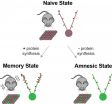Deciphering dark and bright
2015-05-28
(Press-News.org) The human sensory systems contend with enormous diversity in the natural world. But it has been known for a long time the brain is adapted to exploit statistical regularities that nonetheless arise amongst this diversity. Research publishing this week in PLOS Computational Biology reports that established statistical distributions of visual features, such as visual contrast, spatial scale and depth, differ between dark and bright components of the natural world.
For scientists Emily Cooper and Anthony Norcia, gaining a more detailed description of statistical regularities in the natural world leads to a further understanding of how the nervous system has adapted to its environment.
Distinguishing between dark and bright visual features is a key computation of early visual pathways. However, the authors demonstrate that the dark and bright visual patterns driving cortical networks are asymmetric, producing predictable differences that may be exploited by the brain.
The authors expect that this dichotomy in dark and bright plays a key role in the generation of cortical and perceptual asymmetries.
"Our sensory systems are so tied to the demands of our environment that looking outwards to study world around us can often provide insights into what might be going on inside the brain," says Emily Cooper.
INFORMATION:
All works published in PLOS Computational Biology are Open Access, which means that all content is immediately and freely available. Use this URL in your coverage to provide readers access to the paper upon publication: http://www.ploscompbiol.org/article/info:doi/10.1371/journal.pcbi.1004268
Press-only preview: https://www.plos.org/wp-content/uploads/2015/05/pcbi.1004268-Cooper.pdf
Contact:
Emily A. Cooper
Address: Dartmouth College
Dept. of Psychological and Brain Sciences
6207 Moore Hall
Hanover, NH 03755
UNITED STATES
Phone: 773-655-3896
Email: emily.a.cooper@dartmouth.edu
Citation: Cooper EA, Norcia AM (2015) Predicting Cortical Dark/Bright Asymmetries from Natural Image Statistics and Early Visual Transforms. PLoS Comput Biol 11(5): e1004268. doi:10.1371/journal.pcbi.1004268
Funding: This work was supported by National Institutes of Health Grant 5R01EY018875-05 (AMN) and a research contract between Sony Corporation and Stanford University (AMN). The funders had no role in study design, data collection and analysis, decision to publish, or preparation of the manuscript.
Competing Interests: The authors have declared that no competing interests exist.
About PLOS Computational Biology
PLOS Computational Biology features works of exceptional significance that further our understanding of living systems at all scales through the application of computational methods. All works published in PLOS Computational Biology are Open Access. All content is immediately available and subject only to the condition that the original authorship and source are properly attributed. Copyright is retained. For more information follow @PLOSCompBiol on Twitter or contact ploscompbiol@plos.org.
About PLOS
PLOS is a nonprofit publisher and advocacy organization founded to accelerate progress in science and medicine by leading a transformation in research communication. For more information, visit http://www.plos.org.
ELSE PRESS RELEASES FROM THIS DATE:
2015-05-28
Retrograde amnesia is the inability to recall established memories. In humans, amnesia is associated with traumatic brain injury, Alzheimer's disease, and other neurological conditions. Whether memories lost to amnesia are completely erased or merely unable to be recalled remains an open question. Now, in a finding that casts new light on the nature of memory, published in Science, researchers from the RIKEN-MIT Center for Neural Circuit Genetics demonstrated in mice that traces of old memories do remain in the amnestic brain, and that the cellular pathways underlying them ...
2015-05-28
Elevated plasma triglyceride level is considered a risk factor for type-2 diabetes, but new findings suggest that a genetically-elevated triglyceride level is associated with protection against type-2 diabetes. Yann Klimentidis, an Assistant Professor at the Mel and Enid Zuckerman College of Public Health at the University of Arizona, and colleagues found that triglyceride-increasing alleles are associated with decreased type-2 diabetes incidence. Their findings were published recently in PLOS Genetics.
Building on previous studies that hinted to the same association, ...
2015-05-28
Dany Gaillard and colleagues at the University of Colorado Anschutz Medical Campus have discovered a key molecular pathway that aids the renewal of taste buds, a finding that may help cancer patients suffering from an altered sense of taste during treatment. Their findings were published recently in the journal PLOS Genetics.
"Many cancer drugs which circulate throughout the entire body, will target a tumor but in the process affect healthy cells," said the study's senior author Linda Barlow, a professor of cell and developmental biology at University of Colorado Anschutz ...
2015-05-28
AURORA, Colo. (May 28, 2015) - Researchers at the University of Colorado Anschutz Medical Campus have discovered a key molecular pathway that aids in the renewal of taste buds, a finding that may help cancer patients suffering from an altered sense of taste during treatment.
"Many cancer drugs, which circulate throughout the entire body, will target a tumor but in the process affect healthy cells," said the study's senior author Linda Barlow, PhD, professor of cell and developmental biology at CU Anschutz. "That in turn will alter a person's sense of taste leading to ...
2015-05-28
CAMBRIDGE, MA -- Memories that have been "lost" as a result of amnesia can be recalled by activating brain cells with light.
In a paper published today in the journal Science, researchers at MIT reveal that they were able to reactivate memories that could not otherwise be retrieved, using a technology known as optogenetics.
The finding answers a fiercely debated question in neuroscience as to the nature of amnesia, according to Susumu Tonegawa, the Picower Professor in MIT's Department of Biology and director of the RIKEN-MIT Center at the Picower Institute for Learning ...
2015-05-28
This news release is available in Japanese.
Long-held social biases can be reduced during sleep, a new report suggests. It adds further support to recent research that has shown that memories can be selectively reactivated and strengthened during slumber. Scientists have known that sleep boosts memory formation by resuscitating faint neuron activity shaped during earlier periods, when an individual was awake. This process can be experimentally stimulated by giving a sleeping individual cues related to an earlier period of learning. Now, Xiaoqing Hu and colleagues ...
2015-05-28
This news release is available in Japanese. Xiaochun Qin and colleagues have provided a high-resolution crystal structure of a plant protein supercomplex critical to photosynthesis, shedding new light on how this extremely effective solar energy converter achieves its impressive performance. The photosynthesis of many plants relies upon the large light-harvesting complex I (LHC1), which surrounds photosystem I (PSI) and captures sunlight. LHC1 is able to transfer the energy it absorbs to the PSI core, where it is converted into chemical energy with close to 100% efficiency. ...
2015-05-28
This news release is available in Japanese.
Memories that have been destabilized and forgotten by mice can nevertheless be retrieved by activating memory engrams, or specific patterns of neurons that fire when memories are encoded, with light, researchers say. These findings provide fresh insight into memory consolidation, or the process by which new, unstable memories transform into stable, long-term memories. Until now, researchers have wondered whether memory consolidation was dependent upon the stabilization of these memory engrams. But Tomás Ryan and colleagues ...
2015-05-28
This news release is available in Japanese.
Armadas of icebergs that broke off the Greenland ice sheet into the northern Atlantic Ocean during the Last Glacial Period -- between about 110,000 and 12,000 years ago -- often increased methane production in the tropics, according to a new study. These findings illustrate how high-latitude events can influence tropical climate conditions, and they hint at the underlying mechanisms of abrupt climate changes. Such massive discharges of icebergs into the Atlantic are known as Heinrich Events, and researchers have wondered for ...
2015-05-28
CHICAGO --- HIV has a voracious sweet tooth, which turns out to be its Achilles' heel, reports a new study from Northwestern Medicine and Vanderbilt University.
After the virus invades an activated immune cell, it craves sugar and nutrients from the cell to replicate and fuel its wild growth throughout the body.
Scientists discovered the switch that turns on the immune cell's abundant sugar and nutrient pipeline. Then they blocked the switch with an experimental compound, shutting down the pipeline, and, thereby, starving HIV to death. The virus was unable to replicate ...
LAST 30 PRESS RELEASES:
[Press-News.org] Deciphering dark and bright


